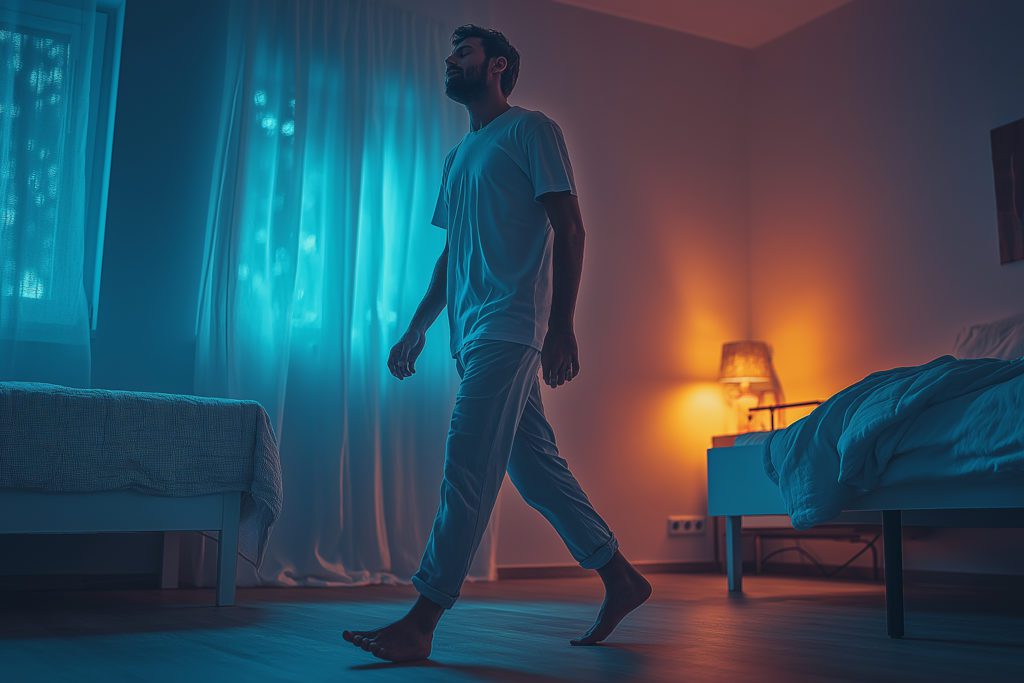
Night Terrors vs. Nightmares: How to Tell the Difference and What to Do
Many individuals will experience nightmares or night terrors at some point in their lives. However, most need help understanding the differences between the two.

Nightmares and night terrors are some of the most commonly experienced sleep issues. Knowing how to identify each will help you understand what you can do about them so that you can enjoy a more peaceful night's rest.
What Are Nightmares?
A nightmare is a dream consisting of distressing and realistic imagery that jolts you awake. These dreams often leave you feeling scared, anxious and upset, making it difficult to fall back asleep. Sometimes nightmares can cause physical symptoms as well, including a rapid heart rate or sweating. If you have frequent nightmares, they may affect your ability to function during the day.
Usually, nightmares occur during the rapid eye movement (REM) stage of sleep. Because REM sleep occurs for a lengthier period as the night wears on, you are more likely to experience nightmares closer to waking. The critical difference between nightmares and bad dreams is that nightmares are startling enough to arouse you from sleep, while you may sleep throughout bad dreams without waking up. Additionally, a bad dream will not usually cause physiological responses.
What Are Night Terrors?
Night terrors differ substantially from nightmares in several ways. While night terrors also feature distressing details, people do not wake up during these episodes. Instead, they continue to sleep while experiencing extreme psychological distress with a notable physical response. Night terrors feature symptoms such as heavy breathing, sweating, flushed skin, and increased heart rate. Additionally, they may sit upright in their bed and scream or thrash with their eyes wide open. Sleepwalking is also common. What is especially noteworthy about night terrors is that those who experience them don't usually remember what happened in the morning.
How Can You Tell the Difference Between Nightmares and Night Terrors?
There are several ways to tell the difference between night terrors and nightmares. These main distinctions include:
- Sleep stage: While nightmares occur during REM sleep, night terrors occur during slow-wave sleep
- Frequency: Nightmares are common among children and adults. However, night terrors rarely occur in adults, while children tend to have them more often.
- Memories: Those who experience night terrors rarely recall the episode. However, many people can recall the details of their nightmares.
- Wakefulness: A person experiencing night terrors will remain asleep, even when sleepwalking. Nightmares may cause a person to wake up feeling panicky or anxious.
While nearly everyone will experience nightmares at some point, night terrors are less common. Additionally, night terrors may distress the dreamer and those around them during the event. They tend to be more disturbing to others since they are quite intense to observe.
How Common Are Night Terrors?
While most people have experienced a nightmare in their lifetimes, night terrors tend to occur less frequently among the population. Around 2.2% of adults will experience night terrors, while 6.5% of children will be affected at some point during childhood. There are certain factors associated with an increased frequency of night terrors. These conditions may include:
- Traumatic experiences - Nightmares and night terrors are common symptoms of posttraumatic stress disorder and childhood trauma.
- Stress and anxiety - Prolonged periods of emotional distress and anxiety increase your likelihood of experiencing night terrors.
- Medications - Certain types of medications, including sleep aids and beta blockers, can frequently cause sleep issues.
- Mood disorders - Night terrors and nightmares are more frequent in those diagnosed with generalized anxiety disorder, depression and bipolar disorder.
- Substance abuse - Alcohol, recreational drug abuse and withdrawal are associated with decreased sleep quality, which may cause night terrors.
- Genetic history - Those with a family history of sleep disturbances may also be more likely to experience them.
- Sleep disorders - Restless leg syndrome, insomnia and sleep apnea can disrupt deep sleep and brain wave activity.
In addition, certain medical conditions such as Parkinson's disease may increase your chances of sleepwalking, night terrors and nightmares.
How To Cope With Night Terrors and Nightmares
While night terrors and nightmares can occur without prior warning, there are several things you can do to minimize their frequency. These tips include improving your sleep habits and addressing your mental health needs.
- Try to wake up and go to bed at the same time. Sticking to a routine will give your body cues for when it's time to wind down.
- Find healthy stress management techniques. Consider journaling or meditating before bedtime to clear your mind of the day's stressors.
- Finish your evening meal at least two hours before bedtime. Your metabolism increases when you eat, which can cause increased brain activity and your chances of nightmares.
- Try not to watch anything scary before you sleep. Avoid action movies and the news, as these can impact the quality of your dreams.
- Get some background noise. If you're uncomfortable with sleeping in silence, you may consider trying a white noise machine. This can also help drown out unpredictable sounds from outside.
- Try breathwork and progressive muscle relaxation. These practices can help you quiet your mind and drift to sleep.
- Use an app to track your sleep. Sleep tracking apps can help track your overall sleep quality.
- Keep your room dark and cool. Sixty-five degrees Fahrenheit seems to be the ideal temperature for falling asleep.
These adjustments to your routine can positively affect your sleep quality as well as minimize your chances of experiencing disruptions.
When Should You See a Doctor for Night Terrors or Nightmares?
Treatment is usually unnecessary for nightmares or night terrors. However, if you continue to experience significant sleep disturbances after making lifestyle and environmental changes, you may need to consult your doctor. They can determine if you are dealing with an undiagnosed mental health condition or a chronic sleep disorder.
Because recurring nightmares and night terrors can significantly affect your ability to focus and cause irritability and mood swings, professional treatment may be beneficial to help you achieve restorative sleep again. Before seeing your doctor, make sure you are tracking your sleep and keeping a record of nightmares and night terrors. This information will be very helpful for your appointment.
FAQ
What is the main difference between nightmares and night terrors?
Nightmares are distressing dreams that cause the sleeper to wake up, while night terrors involve intense fear during sleep, without awakening the person. Nightmares occur during REM sleep, while night terrors happen during deep, non-REM sleep.
How can I tell if someone is experiencing a night terror or a nightmare?
During a nightmare, the person may wake up scared but is typically able to remember the dream. In a night terror, the person remains asleep and may scream, thrash, or exhibit signs of panic, often with no recollection of the episode upon waking.
What are common causes of night terrors and nightmares?
Night terrors and nightmares can be triggered by factors like stress, trauma, certain medications, or other sleep disorders. Night terrors often have a genetic component and are more common in children, while nightmares can affect people of all ages.
How common are night terrors compared to nightmares?
Nightmares are common and affect most people at some point in life, while night terrors are rarer and more prevalent in children than adults. Approximately 2.2% of adults experience night terrors, compared to a higher 6,5% among children.
What can I do to reduce night terrors and nightmares?
Consistent sleep routines, stress management, limiting screen time before bed, and creating a relaxing environment can help. Techniques like breathwork, journaling, or using white noise can also aid in minimizing disturbances.
When should I seek professional help for night terrors or nightmares?
If frequent night terrors or nightmares disrupt sleep, affect daily life, or cause safety concerns, consulting a sleep specialist or healthcare provider is recommended. Professional guidance can identify underlying conditions and suggest treatment options.

Written by
Emily Mendez
Emily Mendez is a former therapist and mental health author. She is one of the leading voices in mental health. Emily's writing has appeared in eCounseling, SonderMind, and more. Emily is frequently interviewed by Healthline, Fatherly, INSIDER, Family Circle, and other national media for her advice and expert opinion on the latest mental health topics.
Download Pillow
Get help
Press & News
Legal
Connect
X (Twitter)
Company
Copyright © Neybox Digital Ltd.



